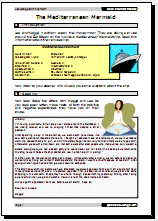What are some of the best ways in which we can improve our lesson preparation?
Back to ESL Talking Points page.
As a newish teacher of only 12 months TEFL service, I obviously have a lot to learn and wouldn't presume to lecture. However, in this age of computerised every-damn-thing, I feel it may be worth sharing this observation. I used to spend hours sitting at my computer, supposedly planning, but actually just 'computing', and being distracted by all the gizmos and whatnots that come bundled with our type-writers these days.
Recently I started planning on my feet, using my brain rather than my fingers. This may sound obvious, but if you're anything like me and have spent far too many hours on a computer over the past 2 decades, you'll agree it's horribly easy to lose hours tip-tapping away and forget the actual purpose of PLANNING, i.e. preparing to facilitate a learning session for a room full of people.
This problem is exacerbated by training institutions who slavishly insist on standardised, uber-detailed, word-processed lesson-plans. Typing is not planning, but it can feel like it is.
dan mcardle

Come and join esl-lounge Premium.
- High quality PDF lesson plans.
- Full teacher notes - zero preparation time.
- mp3 listening materials.
- Full color flashcards for grammar/vocabulary teaching.
- Thousands of content members from around the world.
- Lesson plans in both British and American English.
Premium Home Page | Free Samples | Why Join | FAQ | Sign Up!
Take The Tour
★ Special Coupon Discount★
$8 off Lifetime Membership. Enter coupon code 8LIFE at registration.
(valid for this month)
To improve lesson plans, we need to keep our eyes on both what the student needs and what they paid for. As a school manager, it would be crazy for me to ignore the course material and fail to complete the material. You may teach the material in a lively and vibrant manner and still finish it, all the while planning diversions away from the book to keep the students supplied with current material.
The students, more often than not, the parents of the student, pay to improve their English, this is true. However, many will evaluate their progress by how much of the course material they have mastered. You really can have it both ways, improve their English and use a book.
Preparation will make even the most boring text come to life.
Dale C
To improve lesson plans, we need to include more information to our students of one subject instead of less information for many subjects.
Providing them the tools to look for information in books or web pages, and modeling in them the "how to learn more" of any subject using one of the subject learning with steps.
Diana
One of the most important ways in which we can be better lesson preparers and therefore better teachers is to know our students better. Actually know them as people rather than just objects to instruct. Once we start to know them as people, the materials that we use with them in the classroom and the lessons we prepare for them will be so much the better.
I began teaching only a few years ago and, like most teachers, opened the book at the next page and did whichever material, whichever lesson was there waiting for me. This would be irrespective of whether I had a young teen class of girls wanting to talk about Ricky Martin or a class of Japanese Air Conditioning Salesmen wanting to discuss sales technique. If Unit Four was about saving the tiger in Kashmir, that's what we did.
After a year or two, I realised I wasn't getting the most out of my students or of my teaching time and now I prefer to talk about Ricky Martin or air conditioning. We must all remember one very important thing. Students usually walk into a school and say "I want to learn/improve my English." What they do NOT say is "I want to complete Headway Intermediate" or whatever other coursebook you have the misfortune to be saddled with.
Adapting materials to students is a major part of ESL that is still undervalued or even ignored today and must be tackled. Too often, the problem is that schools are run too much like businesses and coursebooks have to be taught, even to the extreme that they have to be finished, otherwise the customers, sorry the students, in the mind of the school owner, "aren't getting what they paid for". As I stated before, what they paid for was to LEARN ENGLISH. Are we losing sight of that??
Richard Todd, Athens
Over the years I have discovered that in preparing lessons I should keep in mind that each student is an unique learner, and needs to be treated as such. In a learning situation the student is the most important component.Therefore I should take care to see that in all lessons that I prepare ,there is flexibility to modify the course according to the needs of the students.
shahnaaz
I don't think it is only enough to find sites like this and to find materials. Your materials need to be right for your students - for their interests and for their age group and for their level. So I think the internet can help you to a certain extent but it is not everything and you should rely more on the knowledge that you have of your students.
I think realia is important too - especially if you are teaching a group of students who then want to go and live in an English-speaking country. It can be bus timetables, restaurant menus, pizza take away menus, car hire company literature, etc. Anything with the target language on it being used in an authentic way.
Teresa, Bogota, Colombia
